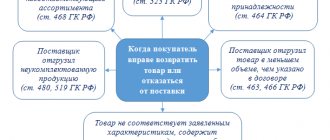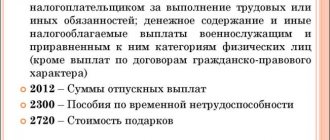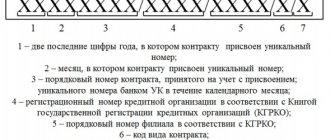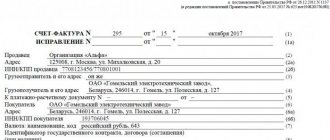Types of securities In accounting, for the purposes of revaluation, securities are divided into: - financial investments for which the current market value can be determined (securities listed (admitted for circulation) on the organized securities market); — financial investments for which the current market value is not determined (securities that are not quoted (not admitted to circulation) on the organized securities market). Depending on what type of security the security is, the rules for current revaluation and the reflection of its results will be different (revaluation (increase in value), markdown (decrease in value) or the formation of an impairment reserve). This procedure follows from paragraphs 18–22 and section VI of PBU 19/02.
Quoted securities Quoted securities are accepted for accounting at historical cost.
Rules for accounting for shares in accounting (nuances)
If, as of the reporting date, the organizer of trading on the securities market does not calculate the market price of securities in the prescribed manner, then for the purposes of financial statements as of that date, it is advisable to take the latest market price at the time of calculation as the current market value of these securities. The procedure for calculating the market price of issue-grade securities and investment shares of mutual investment funds admitted for circulation through trade organizers, and establishing the maximum limit for market price fluctuations, is established in Resolution of the Federal Securities Commission of Russia dated 01.01.2001 N 03-52/ps.
Revaluation and “transfer” of shares
The provisions of the order include financial investments for which their current market value is not determined. The current market value of securities, according to paragraph 13 of PBU 19/02, means their market price, calculated in the prescribed manner by the organizer of trading on the securities market. When determining the current market value of financial investments in accounting and financial statements, information on the market price of financial investments not only of Russian organizers of trading on the securities market, but also of foreign organized markets or organizers of trade that have the appropriate license from a national authorized body (Letter Ministry of Finance of the Russian Federation dated May 15, 2003 N 16-00-14/162).
Situation
The organization had on its balance sheet shares of another enterprise acquired several years ago. The shares at their original cost were listed on account 58 “Financial Investments”.
In 2006, the organization transferred shares as a contribution to the authorized capital of another enterprise. At the same time, the shares were assessed by an independent appraiser, as a result of which their market value increased.
The accountant had the following questions: What accounting entries need to be made in connection with the revaluation and transfer of shares? Is the difference between the original cost of shares and their value after revaluation subject to income tax?
The presence and movement of investments in shares of other enterprises are taken into account in account 58 “Financial Investments”, sub-account “Shares and Shares”. The accounting procedure for financial investments is regulated by PBU 19/02 “Accounting for financial investments.”
Financial investments are accepted for accounting at their original cost, which includes the actual costs of their acquisition, with the exception of VAT and other refundable taxes (except for cases provided for by the legislation of the Russian Federation on taxes and fees) ( see paragraphs 8 and 9 of PBU 19/02 ).
Let us assume that in this situation the initial cost of shares of another company acquired by the organization is 80,000 rubles. Then the following entry is made in the organization’s accounting:
Debit 58/"Shares" - Credit 76/"Settlements with the seller of shares" - 80,000 rubles - acquired shares are taken into account.
Accounting and tax accounting for the revaluation and sale of shares traded on the securities market
Check for impairment At least once a year (as of December 31 of the current year) in accounting, check for impairment of securities (i.e., for current liquidity - saleability) if there are signs of a decrease in their price. Such signs, in particular, include: - the issuer is declared bankrupt or has signs of bankruptcy; — making a significant number of transactions in the securities market with similar securities at a price significantly lower than their book value; — absence or significant reduction in income payments on securities (for example, dividends, interest, coupons, etc.) with a high probability of their further reduction. To conduct the audit, determine the estimated value of a particular security and compare it with the book value of the security.
Features of payment in foreign currency for loans and borrowings
Loans received by companies are:
- Short-term (up to 12 months).
- Long-term (more than a year).
In the first case, accounts are used to account for them. 66, 66.21, 66.22, and operations are reflected as follows:
| Debit | Credit | A comment |
| 52 | 66.21 | Money was credited to the foreign currency account as a short-term loan |
| 66.21 | 52 | Transfer of funds to cover a loan in foreign currency |
| 66.22 | 52 | Interest coverage |
In accounting for long-term loans in $, €, £, accounts are used. 67, 67.21, 67.22:
| Debit | Credit | A comment |
| 52 | 67.21 | Money is credited to a foreign currency account as a long-term loan |
| 67.21 | 52 | Funds transferred to repay the loan |
| 67.22 | 52 | Transferred interest |
Accounting for loans in foreign currency is carried out in a similar way using accounts 66.23 and 67.23.
Revaluation theory
For example, add an item to the accounting policy with the following content: “...Financial investments of an organization that are subject to revaluation for the purpose of reflecting income tax calculations in accounting are divided into the following groups: a) financial investments acquired by the company for the purpose of generating income from their retention ( in the form of dividends, etc.) and the disposal of which is not expected. The revaluation of this group of assets is recognized as a permanent difference and is reflected in accounting as a permanent tax liability; b) financial investments acquired by the company with the aim of generating income from an increase in their value, and other short-term financial investments.
Initial assessment of financial investments
The initial assessment of financial investments is made at the original cost. It refers to actual acquisition costs, excluding refundable taxes.
The actual costs of acquiring assets mean:
- The fees paid to the seller under a sales contract.
- Costs of information and consulting services.
- Interest paid to intermediaries.
- Payments on loans and borrowings, if they were taken out for the acquisition of financial assets, provided that this does not contradict the norms of PBU 10/99 for accounting for expenses and PBU 15/2008 for accounting for loans and credits.
- Other costs that are actually related to the acquisition of assets.
Obtaining assets with loan funds is associated with borrowing costs, which must be accounted for as other expenses in accordance with PBU 10/99 and PBU 15/2008.
There is a certain list of costs that are not included in the actual cost of purchasing financial investments:
- General expenses.
- Consulting costs on financial investments that were not made.
- The difference in rates for investments that were paid after registration.
- Payments on loans that were accrued after the asset was registered on the books.
The listed costs must be included among other expenses and reflected in account 91-2.
Annual revaluation of other people's shares on the balance sheet of the enterprise
According to supporters of this position, when revaluing financial investments, leading to the formation of income in accounting, taxable temporary differences are formed and, accordingly, deferred tax liabilities. Upon further revaluation or disposal of the asset, the deferred tax liability is adjusted. Let's return to our example.
In this case, the accountant makes the following entries: Debit 58, Credit 91 - 1000 rubles. ((2 rubles - 1 ruble) x 1000 pcs.) - reflects the difference formed as a result of the revaluation of financial investments; Debit 91, Credit 99 - 1000 rub. — accounting profit is reflected as a result of revaluation; Debit 99, Credit 68 - 240 rub. (RUB 1,000 x 24%) - reflects the conditional income tax expense; Get the full text Debit 68, Credit 77 - 240 rub. (RUB 1,000 x 24%) - deferred tax liabilities are reflected; Debit 99, Credit 84 - 760 rub. (1000 rub.
Date: 01.04.2011 13:33Author: didal Registration: 10.08.2006Messages: 1306 As far as I understand, the question was about the possibility of increasing the value (according to accounting data) of the organization’s long-term financial investments (possibly to increase the value of net assets without payment of additional property tax), and not about increasing the authorized capital of this organization or another legal entity - the issuer of securities on the balance sheet of this very organization. In addition, I do not agree that it is impossible to convert shares into shares of the same category (type) with a higher par value using additional capital formed as a result of the revaluation of fixed assets carried out by the joint-stock company on its own initiative. In this case, you will have to pay a state fee for registering the issue of securities and the shareholders will supposedly have taxable income.
With uv. lexander Date: 03/31/2011 11:03 Author: AL1 Registration: 03/15/2010 Messages: 24 Hey, corporate people... Does anyone know anything on this issue, huh? Is it really possible that “nobody here has ever overvalued the shares?” Date: 03/31/2011 18:02 Author: didal Registration: 08/10/2006 Messages: 1306 The last time I encountered something like this was at the end of 2006. The PA hired an auditor to give an opinion (they decided to take insurance) and, of course, an appraiser. As a result, the LLC increased the book value (according to accounting data) of the shares several times in accordance with the appraiser’s report.
The difference, if my memory serves me correctly, was attributed to profit after taxation. That is, according to accounting data. However, the value of shares on the LLC’s balance sheet increased, but for tax purposes remained the same.
| Dear visitors! The site offers standard solutions to problems, but each case is individual and has its own nuances. |
| If you want to find out how to solve your particular problem, call toll-free ext. 504 (consultation free) |
Consequently, transactions for the sale of shares and shares should be reflected in the following entries: D 91 K 58 - for the amount of the book value of the shares; D 62 K 91 - for the amount of the contractual value of the financial investments being sold; D 51 K 62 - for the amount of funds actually received If a reserve was previously created for the depreciation of investments in securities for the shares or shares being sold, it must also be written off. Example 2. An organization purchased shares with a total value of 100,000 rubles in August.
Revaluation of securities in tax accounting
There is no need to revalue shares on the date of sale. The financial result from the sale of shares is determined by the following formula: ┌───────────── ┌────────────── ┌────── ──── ────── ┌─────────── Accounting Sales price Cost of shares Expenses profit = shares, - according to the last one - for sale (loss) established valuation (accounting value of shares in the contract) └─── ────────── └────────────── └────────────── ── └─────── ──── Tax accounting for the sale of shares Let us say right away that the sale of securities (shares) is not subject to VAT. Therefore, input VAT on expenses associated with the sale of securities is not deductible, but is included separately in expenses.
Types of securities In accounting, for the purposes of revaluation, securities are divided into : - financial investments for which the current market value can be determined (securities listed (admitted for circulation) on the organized securities market); — financial investments for which the current market value is not determined (securities that are not quoted (not admitted to circulation) on the organized securities market). Depending on what type of security the security is, the rules for current revaluation and the reflection of its results will be different (revaluation (increase in value), markdown (decrease in value) or the formation of an impairment reserve). This procedure follows from paragraphs 18–22 and section VI of PBU 19/02. Quoted securities Quoted securities are accepted for accounting at historical cost. This follows from paragraph 4 of paragraph 38, paragraph 2 of paragraph 39 of PBU 19/02, paragraph 7 of PBU 9/99, paragraph 11 of PBU 10/99 and the Instructions for the chart of accounts (accounts 59 and 91). When taxing, do not create a reserve for the depreciation of securities, regardless of the tax regime that the organization applies. This is due to the fact that when calculating income tax, such a reserve is created only by professional participants in the securities market engaged in dealer activities for the depreciation of quoted securities. Unlike most other types of property of an organization (fixed assets, inventories, etc.), the revaluation of which is carried out only in exceptional cases, PBU 19/02 provides for changes in the initial value of certain categories of financial investments.
Revaluation of securities for which the current market value is determined is carried out at the time of change in quotations on the securities market. At the same time, income received from such revaluation (positive difference) is not taken into account when determining the tax base for income tax (subclause 24, clause 1, article 251 of the Tax Code of the Russian Federation). [12] Equally, loss from the revaluation of securities (negative difference) is not accepted for tax purposes (clause 46 of Art.
270 of the Tax Code of the Russian Federation). As for the taxation of such transactions, in the situation under consideration the organization does not bring financial investments (securities) to their market value, but receives coupon (that is, fixed) or interest income. Therefore, such amounts are subject to inclusion in the tax base for income tax, regardless of the actual receipt of funds (for organizations accounting for income and expenses on an accrual basis) (clause 1 of Art.
271 of the Tax Code of the Russian Federation). Moreover, for tax purposes, such income is recognized as received and is included in the corresponding income at the end of the corresponding reporting period, regardless of the terms of the agreements (clause. After all, according to clause 2 of Article 280 of the Tax Code of the Russian Federation, upon the sale (other disposal) of a security, it is taken into account as expenses the purchase price of a security, which in this case does not exist (the security was received free of charge) (letter of the Ministry of Finance of Russia dated 06/07/2006 N 03-03-04/2/157).
Revaluation of securities In accounting, the original cost of securities may change. Securities traded on the securities market must be revalued monthly or quarterly to the current market value with the difference allocated to other income (expenses) (clause 20 of PBU 19/02).
In the financial statements, securities for which an impairment reserve has been formed are shown at their estimated value, which is equal to the difference between the book value (account 58) and the amount of the reserve (account 59). The balance of account 59 is not shown separately in the balance sheet (clause 38 of PBU 19/02). When retiring securities for which a reserve was created, the amount of the reserve is included in the organization’s other income at the end of the year or the reporting period when their disposal occurred (Debit 59 - Credit 91). For profit tax purposes, securities, including those traded on the securities market, are not subject to revaluation. Reflect the results of the revaluation as a decrease or increase in the initial (book) value of securities and other expenses or income of the organization.
To do this, reflect the difference between the new valuation of securities as of the reporting date and their previous valuation on account 58 “Financial investments in correspondence with account 91 “Other income and expenses”. Make the following entries: DEBIT 58 CREDIT 91-1 – reflects the revaluation of securities; DEBIT 91-2 CREDIT 58 – reflects the markdown (impairment) of securities. This procedure follows from paragraph 20 of PBU 19/02, paragraphs 7, 10. 5 and 16 of PBU 9/99, paragraphs 11 and 14. 4 of PBU 10/99 and the Instructions for the chart of accounts (accounts 58 and 91). When calculating taxes, do not take into account the revaluation of listed securities, regardless of the tax regime that the organization applies. For the general taxation regime, this is explained as follows. Check for impairment At least once a year (as of December 31 of the current year) in accounting, check for impairment of securities (i.e., for current liquidity - saleability) if there are signs of a decrease in their price.
Such signs, in particular, include: - the issuer is declared bankrupt or has signs of bankruptcy; — making a significant number of transactions in the securities market with similar securities at a price significantly lower than their book value; - absence or significant reduction in payments of income on securities (for example, dividends, interest, coupons, etc. This procedure follows from paragraph 22 and section VI of PBU 19/02. If the initial cost of unquoted debt securities (for example, bills or unquoted bonds) differs from their face value, the organization can attribute this difference to financial results (other income or expenses). This must be done evenly throughout the circulation period of the security, according to the income due on it, provided for when it was issued.
This procedure is provided for in paragraph 22 and section V of PBU 19/02. At the same time, make accounting entries similar to entries for the revaluation of quoted securities. In particular, an organization can use this procedure to take into account the discount on a bill or the discount on a bond. For tax purposes, adjustment of the value of debt securities towards par value according to rules similar to accounting is not provided for (letter of the Ministry of Finance of Russia dated April 8, 2005. When creating a reserve in accounting, reflect the occurrence of a permanent difference and the corresponding permanent tax liability arising due to , that during taxation such a reserve is not created.
If the amount of the reserve decreases (including from the disposal of securities or an increase in their estimated value), reflect the occurrence of a permanent difference and the corresponding permanent tax asset. Form it through financial results. That is, include its amount in other expenses of the organization.
The amount of the provision may change in cases where: - during subsequent impairment tests, the estimated price of the security changes (decreases or increases); — subsequent audits revealed that the securities no longer meet the criteria for impairment; — a depreciating security is retired.
Quoted securities are accepted for accounting at their original cost. However, at the end of each year, the value of quoted shares must be reflected in accounting and financial statements at the current market value. To do this, you should adjust their assessment as of the previous reporting date, decreasing or increasing it.
Revaluations can be done monthly or quarterly. The frequency of revaluation is fixed in the accounting policy of the organization (clause 7 of PBU 1/2008). If the original cost of unquoted debt securities (for example, bills or unquoted bonds) differs from their par value, the entity may charge the difference to financial results (other income or expenses). This must be done evenly during the circulation period of the security, according to the income due on it, provided for when it was issued. This procedure is provided for in paragraph 22 and section V of PBU 19/02. If the amount of the reserve decreases (including from the disposal of securities or an increase in their estimated value), reflect the occurrence of a permanent difference and the corresponding permanent tax asset. They arise due to the fact that the amount of the reserve created for the depreciation of these financial investments in accounting increases the organization’s income, but is not taken into account when calculating income tax (subclause 25, clause 1, art.
251 of the Tax Code of the Russian Federation). The decision to revaluate securities is formalized by order of the manager. Reflect the results of the revaluation of securities in an act drawn up in any form. Confirm the conclusions about revaluation, depreciation, and depreciation of securities made in the report with documents (for example, reports on securities quotations based on trading results on the date of revaluation, the conclusion of an independent appraiser, etc.).
This procedure follows from Article 9 of the Law of December 6, 2011 No. 402-FZ. To conduct the audit, determine the estimated value of a particular security and compare it with the book value of the security. Select (develop) the methodology by which the settlement price is determined yourself and establish it in the organization’s accounting policy (clause 7 of PBU 1/2008). For example, for this you can attract an independent appraiser or (for
Read on the Russia-Ukraine website:
- Redevelopment of an Apartment Is It Possible to Enlarge the Corridor at the Expense of the Room
- List of Documents for Removing the Encumbrance on a Military Mortgage
- Letter to the Tax Office about Change of Legal Address and OKTMO Sample
- Letter to the Governor Requesting Assistance in Repairing a Leaking Roof
- Letter Appeal to Potential Client vv
Attention!
Due to recent changes in legislation, the legal information in this article may be out of date! Our lawyer can advise you free of charge - write your question in the form below.









